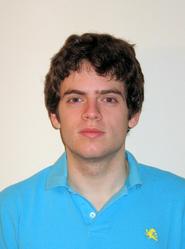
Earlier this summer we spoke to Stephen Okin, who has an Emerson grant to research the increasingly shaky relationship between Venezuela and the U.S. With the recent media coverage of Venezuelan President Hugo Chavez, it seemed timely to catch up with Okin and get an update on his research.
Okin, a sophomore from New York City, spent his summer researching Venezuela and Chavez. The Venezuelan leader, a colorful soldier-politician elected in 1998 and reelected in 2006, is a legally elected official who is equally perceived as a threat to the U.S. Chavez constitutes a threat both because of his popularity and power in South America, and because he controls the large quantity of oil in Venezuela.
As Okin summarized it, "Chavez is a threat to regional stability, democracy, and our interests in Latin America." Okin's research, which has been mainly a literary review of existing sources, analyzed the issue by dividing U.S./Venezuela relations into two separate relationships: economic and diplomatic. The economic relationship (which revolves around oil) is still fairly stable, but the diplomatic relations are "in tatters," a state which has begun to affect the economic relationship. Okin added that Chavez is a further threat because of his international ambitions
In his research paper, Okin addresses the problem of how the U.S. should behave toward its unsteady Southern neighbor. Although intervention and regime change has been suggested as a method for neutralizing Chavez, Okin rejects this possibility and suggests instead a more internal set of changes is key. His first suggestion is a move towards fuel conservation and green technology. "Half of the threat Chavez poses is his ability to cut off oil exports to the U.S. and cause severe damage to our economy," Okin emphasized. With a more aggressive oil use policy, Chavez would lose a valuable lever.
The other policy Okin urges is to "beat Chavez at his own game." The president was elected because of his stance on poverty and aid; his popularity is due to the effects of his policies, not the beliefs behind them. It should be possible, Okin argues, to offer Venezuela the same amount of aid without espousing Chavez's trenchant policies. In short, "the U.S. must seek to work cooperatively with Caracas on a range of issues that matter in the region, such as poverty, education, terrorism, indigenous rights, etc."
Okin is optimistic that both of these policies can be implemented by a new U.S. government, and hopes to see an improvement of quality of life in the region, as well as U.S. popularity. "I feel all the things Chavez is doing now in Venezuela could be accomplished by a regime more friendly to the U.S. as long as the U.S. is willing to work to improve the region," Okin concluded.
-- by Lisbeth Redfield
Okin, a sophomore from New York City, spent his summer researching Venezuela and Chavez. The Venezuelan leader, a colorful soldier-politician elected in 1998 and reelected in 2006, is a legally elected official who is equally perceived as a threat to the U.S. Chavez constitutes a threat both because of his popularity and power in South America, and because he controls the large quantity of oil in Venezuela.
As Okin summarized it, "Chavez is a threat to regional stability, democracy, and our interests in Latin America." Okin's research, which has been mainly a literary review of existing sources, analyzed the issue by dividing U.S./Venezuela relations into two separate relationships: economic and diplomatic. The economic relationship (which revolves around oil) is still fairly stable, but the diplomatic relations are "in tatters," a state which has begun to affect the economic relationship. Okin added that Chavez is a further threat because of his international ambitions
In his research paper, Okin addresses the problem of how the U.S. should behave toward its unsteady Southern neighbor. Although intervention and regime change has been suggested as a method for neutralizing Chavez, Okin rejects this possibility and suggests instead a more internal set of changes is key. His first suggestion is a move towards fuel conservation and green technology. "Half of the threat Chavez poses is his ability to cut off oil exports to the U.S. and cause severe damage to our economy," Okin emphasized. With a more aggressive oil use policy, Chavez would lose a valuable lever.
The other policy Okin urges is to "beat Chavez at his own game." The president was elected because of his stance on poverty and aid; his popularity is due to the effects of his policies, not the beliefs behind them. It should be possible, Okin argues, to offer Venezuela the same amount of aid without espousing Chavez's trenchant policies. In short, "the U.S. must seek to work cooperatively with Caracas on a range of issues that matter in the region, such as poverty, education, terrorism, indigenous rights, etc."
Okin is optimistic that both of these policies can be implemented by a new U.S. government, and hopes to see an improvement of quality of life in the region, as well as U.S. popularity. "I feel all the things Chavez is doing now in Venezuela could be accomplished by a regime more friendly to the U.S. as long as the U.S. is willing to work to improve the region," Okin concluded.
-- by Lisbeth Redfield
